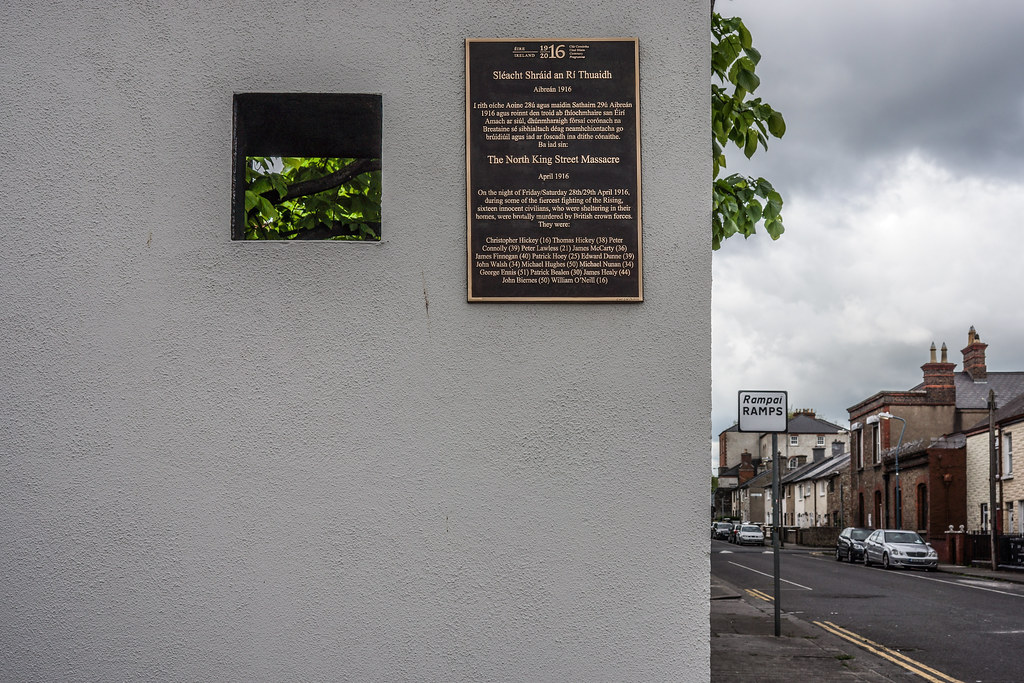NORTH KING STREET MASSACRE
SORRY FOR THE DELAY
MEMORIAL TO NORTH KING STREETS VICTIMS [1916 - NORTH KING STREET MASSACRE]
I did not notice this plaque until this week.
Almost 500 people were killed in the Easter Rising. About 54% were civilians, 30% were British military and police, and 16% were Irish rebels. More than 2,600 were wounded. Many of the civilians were killed as a result of the British using artillery and heavy machine guns, or mistaking civilians for rebels. Others were caught in the crossfire in a crowded city. The shelling and the fires it caused left parts of inner city Dublin in ruins.
A major major scene of fighting during the week was in the area of North King Street, north of the Four Courts. The rebels had established strong outposts in the area, occupying numerous small buildings and barricading the streets. From Thursday to Saturday, the British made repeated attempts to take the area, in what was some of the fiercest fighting of the Rising. As the troops moved in, the rebels continually opened fire from windows and behind chimneys and barricades. At one point, a platoon led by Major Sheppard made a bayonet charge on one of the barricades, but was cut down by rebel fire. The British employed machine guns and attempted to avoid direct fire by using makeshift armoured trucks, and by mouse-holing through the inside walls of terraced houses to get near the rebel positions.[95] By the time of the rebel headquarters' surrender on Saturday, the South Staffordshire Regiment under Colonel Taylor had advanced only 150 yd (140 m) down the street at a cost of 11 dead and 28 wounded. The enraged troops broke into the houses along the street and shot or bayoneted 15 unarmed male civilians whom they accused of being rebel fighters. The youngest was 16 years.
There was no public inquiry into the massacre; the British Army conducted its own internal military inquiry and no action was taken. In fact, the General Officer Commanding of the British Army in Ireland, General Maxwell justified his troops’ actions, stating that such incidents, “are absolutely unavoidable in such a business as this” and “responsibility for their deaths rests with those resisting His Majesty’s troops in the execution of their duty.”
I did not notice this plaque until this week.
Almost 500 people were killed in the Easter Rising. About 54% were civilians, 30% were British military and police, and 16% were Irish rebels. More than 2,600 were wounded. Many of the civilians were killed as a result of the British using artillery and heavy machine guns, or mistaking civilians for rebels. Others were caught in the crossfire in a crowded city. The shelling and the fires it caused left parts of inner city Dublin in ruins.
A major major scene of fighting during the week was in the area of North King Street, north of the Four Courts. The rebels had established strong outposts in the area, occupying numerous small buildings and barricading the streets. From Thursday to Saturday, the British made repeated attempts to take the area, in what was some of the fiercest fighting of the Rising. As the troops moved in, the rebels continually opened fire from windows and behind chimneys and barricades. At one point, a platoon led by Major Sheppard made a bayonet charge on one of the barricades, but was cut down by rebel fire. The British employed machine guns and attempted to avoid direct fire by using makeshift armoured trucks, and by mouse-holing through the inside walls of terraced houses to get near the rebel positions.[95] By the time of the rebel headquarters' surrender on Saturday, the South Staffordshire Regiment under Colonel Taylor had advanced only 150 yd (140 m) down the street at a cost of 11 dead and 28 wounded. The enraged troops broke into the houses along the street and shot or bayoneted 15 unarmed male civilians whom they accused of being rebel fighters. The youngest was 16 years.
There was no public inquiry into the massacre; the British Army conducted its own internal military inquiry and no action was taken. In fact, the General Officer Commanding of the British Army in Ireland, General Maxwell justified his troops’ actions, stating that such incidents, “are absolutely unavoidable in such a business as this” and “responsibility for their deaths rests with those resisting His Majesty’s troops in the execution of their duty.”
